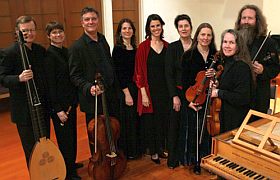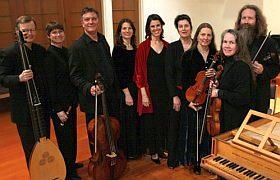
Three-hundred-plus years is a long time to wait for a second performance, especially if the work in question is, according to Warren Stewart, director of Magnificat Baroque, “an exceptional piece” from a time when English opera was flourishing. The good news is that the upcoming performances of John Blow’s Venus and Adonis (2nd version) vest-pocket opera should prove it was well worth the wait.
First, though, we need some historical context as to why what’s called the earliest surviving English “opera” hasn’t been heard more often. The piece itself hasn’t been lost; most people have heard the 1902 version of this work, which is a mix of the earlier two versions. But some digging has brought these first two versions that were written in the 17th century back into the consciousness of early-music aficionados. The first version, believed to have first been performed in 1683 at the court of England’s King Charles II, had its modern premiere last year. The upcoming Bay Area performances serve as the modern premiere of the second version, as revised by the composer, which was completed sometime after the two recorded performances.
In addition to interest in the music, the libretto has also been getting some attention lately. Although it has generally been attributed to the prolific “Anonymous,” and some sources have suggested that one Aphra Behn was responsible for it, an English literature scholar, Dr. James A. Winn of Boston University, makes a convincing case that the until-now-unknown author was most likely Anne Kingsmill (Finch), considered the finest female English poet before the 19th century.
The libretto tends toward a more female view of the story than do Ovid’s or Shakespeare’s versions. It also serves as a commentary on the loose morals of the court, which Kingsmill would have known about firsthand in her role as a Maid of Honor to the Duchess of York. The piece has an intimate air and contains many inside jokes — some subtle and some not — that would have been obvious to the royal audience. Among the latter was that Moll Davis, a mistress of King Charles, played the role of Venus and that Cupid was played by their “natural” daughter, Mary Tudor. Another scene also caused some knowing laughter: When Venus tells of her seduction techniques, she was accompanied by a lone recorder player who just happened to be her lover (and would later be her husband).
Although Kingsmill was notoriously shy about publishing her work, not wanting the courtiers to mock a “versifying Maid of Honor,” in Dr. Winn’s words, she has written a “witty, wise, and highly singable libretto.” He adds, “I hope she will forgive me for having ‘outed’ her.”
Magnificat Baroque’s performances in Menlo Park, Berkeley, and San Francisco will provide a great opportunity to hear the revival of a piece of music history.

